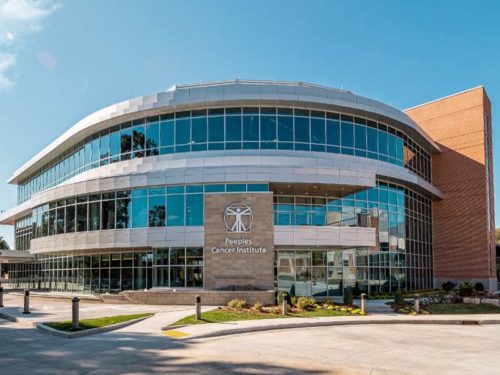 When guests enter Peeples Cancer Institute (PCI), they are welcomed by a greeter who is equipped to answer questions and escort them where needed. The institute has a spacious lobby that was specifically designed to provide a calm, relaxing atmosphere.
When guests enter Peeples Cancer Institute (PCI), they are welcomed by a greeter who is equipped to answer questions and escort them where needed. The institute has a spacious lobby that was specifically designed to provide a calm, relaxing atmosphere.
“First impressions are important and our intent is to clearly convey confidence, tranquility, and healing,” says Ernie Elemento, vice president.
The 46,000-square-foot facility opened in January. Accredited by the Commission on Cancer (CoC), the institute centralizes patient-centered care and outpatient cancer services in one convenient location.
Patient experience is a significant focus of the institute.
“Every aspect of Peeples Cancer Institute is focused on the needs of our patients and families so that we provide an outstanding patient experience and the best clinical outcomes,” says Jeff Myers, president, and CEO of Hamilton Health Care System. “Our goal is to foster collaboration, communication and education among physicians and our medical teams to advance and enhance our care for patients. They are our number one priority.”
Expert Care
Eric Turner, MD (medical director) and Qin Zhang, MD, recently joined PCI. Both are board-certified medical oncologists and specialize in adult cancer and hematology disorders. They join Lisa Duhaime, MD, and Freda Hoffman, APRN, on the medical oncology side. Arif Ali, MD, and Nick Galanopoulus, MD, are both board-certified and provide radiation oncology treatment and services.Surgeons from Hamilton Physician Group – General Surgery all participate in cancer-related surgeries. Surgeons include Richard Fromm, MD; James Gable, MD; Eric Manahan, MD; Steven Paynter, MD; and Rod Rodriguez, MD. Fromm, Manahan, Paynter and Rodriguez are breast cancer specialists.
Other members of the clinical care team include radiologists, pharmacists, clinic nurses, infusion nurses, nurse navigators, radiation therapists, mammography technologists, social workers, researchers, tumor registrars, and other vital staff members.
Under one roof
The goal of integrating all outpatient cancer care services under one roof was the driving force behind the expansion of the oncology program into its newly constructed building. The process was conducted with the needs of the patient, community, and staff in mind.
As the planning process for the new cancer institute began, Hamilton’s leadership and staff engaged the community to provide feedback throughout every step of its design. For example, the initial design did not include a physical connection to the main hospital. After hearing the concerns of the focus group, Hamilton’s leadership worked with the city council to close a public road and allow the construction of a walkway physically connecting the new cancer institute to the main hospital.
PCI centralizes all oncology care in one location, further enhancing physician collaboration and quality patient care. With Hamilton Medical Center connected directly to the institute, in-patient care is enhanced by ease of patient transport.
The community feedback is also reflected in the interior design of the new facility. Patients and caregivers, including those who received cancer care elsewhere, provided their input.
“We heard them loud and clear,” says Elemento. “They did not want to sit in an infusion chair for hours receiving chemotherapy while staring at a wall.” Today, patients receiving treatment in one of the 20 semi-private infusion recliners have expansive views of Dalton through floor-to-ceiling windows that provide abundant natural light. Six additional chairs are private, allowing patients privacy if they prefer.
The latest technology
Equipped with a state-of-the-art Varian™ Truebeam™ Linac and 4D CT simulator, the cancer institute offers a variety of radiation therapy treatment modalities, including IMRT, SRS, SBRT, 3D and HDR brachytherapy.
The Women’s Imaging area offers the latest in 3D mammography, stereotactic biopsy and ultrasound.
Looking to the future, the institute is already looking to expand its capabilities.
Looking ahead
The institute continues to work on opportunities to provide additional treatments and ways to support patients and family members.
The pharmacy is working toward an accredited specialty pharmacy that would include oral oncolytics, specialty drugs that kill cancer cells.
PCI will soon offer patients access to participate in clinical trials. The PCI employs a research coordinator to enroll patients into clinical trials when appropriate, and the institute’s medical oncologists will provide oversight as principle investigators for all trial patients.
As part of the high-risk genetics program, patients will be followed in a high-risk genetics clinic at PCI and receive additional needed services such as annual breast MRI screening or other imaging and testing when appropriate.
The institute will soon offer genetic screening and genetic counseling services. Patients identified as high-risk are given immediate access to a certified genetic counselor through tele-genetics. The new facility is completely wired and ready for telehealth, and its tele-genetics program is the first step in utilizing these new features.
PCI has been working on increasing its menu of supportive care programs for patients.
A donor’s gift is making it possible for the institute to begin planning an arts and healing program that will bring music and art to its patients and caregivers. A therapy dog visits the infusion center weekly, and the Institute is developing a pet therapy program that will allow therapy dogs to visit with patients throughout the facility, thanks to a gift from Dalton Box. The institute will soon welcome a specialized oncology nutritionist to provide nutrition and wellness counseling and services. All supportive care services at PCI are offered free as part of a cohesive cancer-fighting strategy for patients, from prevention and diagnosis to treatment and survivorship.
